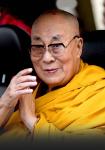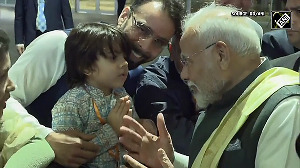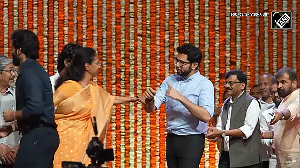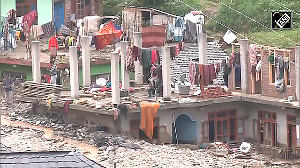Women are great team players and collaborators, 'but they don't put themselves forward,' Dr Gagandeep Kang, the first Indian woman scientist to be elected as a Fellow of the Royal Society, tells Veenu Sandhu.
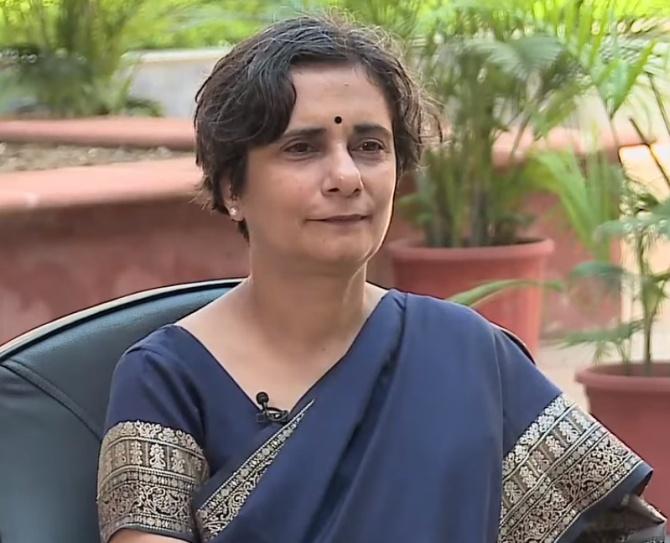
When Benjamin Franklin used a kite and a key to demonstrate the electrical nature of lightning in 1752, the Royal Society -- the oldest independent scientific academy in continuous existence since 1660 -- published the account of the famous experiment.
Before him, it had published Isaac Newton's Principia Mathematica describing the action of gravity, and later the works of Charles Babbage ('the father of computing'), Charles Darwin ('the father of evolution') and Albert Einstein.
Till 1945, the Royal Society had only men as fellows. And until this year, not one of its few women fellows was from India. Gagandeep Kang has changed that.
I meet Dr Kang, 56, at the Imperial Hotel in Delhi where she is attending a three-day conference of the World Health Organisation. She heads WHO South East Asia Region's Immunisation Technical Advisory Group. It's a busy day for her, but she steps out to keep this appointment.
A professor in the gastrointestinal sciences department at Christian Medical College, Vellore, Dr Kang is currently also executive director of the Translational Health Science and Technology Institute in Faridabad, some 30 km from Delhi.
This autonomous institute of the biotechnology department under the science and technology ministry is working to enable faster transition of laboratory research to the market in areas such as vaccines for outbreaks and infectious diseases like tuberculosis and dengue; non-communicable diseases like diabetes; diagnostics; maternal and child health to figure out why India has such a large number of pre-term births, and so on.
A clinician scientist, Dr Kang is a dogged researcher whose major focus has been on viral infections of the gut in children.
Her longest research -- through children who were recruited when they were still in their mothers's womb -- has been ongoing for some 17 years in Vellore.
She has followed these children through infancy and childhood to study how gut infections have affected their physical and mental health, IQ levels and school performance, and whether later interventions can reduce their stunting -- a condition that is thought to be irreversible.
Dr Kang has also been a leading researcher for the testing of an India-specific oral rotavirus vaccine.
The rotavirus affects kids under two, is known to cause severe diarrhoea and kills some 100,000 children in India each year.
The vaccine, Rotavac, which was rolled out as part of the national immunisation programme in 2016, now covers about 50 per cent of the Indian birth cohort (children born during a given calendar time period within a specified geographical region).
"And now, for the first time, its impact assessment is on," says Dr Kang. "We should have the results in about a year for both its efficiency and safety."
Dr Kang's father was an engineer with the Indian Railways and her mother a teacher.
Her childhood was spent moving from one place to the other -- Punjab, Delhi, Uttar Pradesh, Bihar, West Bengal.
Necessity taught her and her sister to adapt quickly and equipped them to catch up with studies every time they changed school mid-session. Dr Kang says she has attended some 10 schools.
Later, when she cleared her medical entrance exam, she chose to go to CMC Vellore -- "an uncle had told me what a fun place it was," she smiles. "He was right. I made great friends and we had a great time."
When news of her getting elected as a fellow of the Royal Society broke, she got an e-mail from one of her teachers at CMC. "He said, 'This is the same girl I wrote a note for saying: Don't you think you should be coming for class?'," she laughs.
After her MBBS, she came to Delhi thinking she would get into ophthalmology.
"But my family has an essential tremor (a neurological condition that causes involuntary trembling), so I thought maybe it wasn't a good idea to become a surgeon."
Instead, she opted for clinical microbiology, "at the end of which I couldn't see myself in a lab all day, every day".
She then moved to the integrated gastroenterology department and got into both clinical and lab work. "Thereon I moved very rapidly into the field, doing public health work," she says.
By now she was back at CMC, Vellore, had joined the faculty, married a neurosurgeon and enrolled for a PhD, which lasted six years and during which both her sons were born. "Bringing up the kids was a bit challenging but because we lived on the hospital campus, I could go back and forth between the lab and home," she says.
Later, during a fellowship to the UK in the late 1990s, where she again worked on diarrhoeal infections, the lab director suggested she should apply the methods she learnt there to stool samples from India. So she wrote to every paediatrician she knew and got her mother and friends also to reach out to paediatricians to collect samples for her.
Armed with her kits from the UK, she returned home to some 500 samples. "My mother had to buy a fridge to store them," she laughs.
She tested them for rotavirus and, based on the findings, went to the Baylor College of Medicine in Houston, US -- "which is one of the best labs for rotavirus," she says.
Its director, Mary K Estes, remains her mentor to date. This was the time when the first rotavirus vaccine had been withdrawn from the US for causing intestinal blockage.
Back in a slum in Vellore, she and her team tried to replicate a rotavirus study done in Mexico.
But they couldn't replicate the promising Mexico findings and spent three years analysing and reanalysing the data to understand why.
They concluded that if a vaccine could be modelled for communties similar to India's, then the children could get about 50 per cent protection from the virus -- which was better than no protection.
Given the phenomenal amount of data and expertise they had gathered, it was only natural that when the time came for vaccine trials, both the vaccine manufacturers and later the government reached out to Dr Kang's laboratory.
In the Vellore slum community, which largely comprises daily wagers, Dr Kang's team had set up a clinic in 2003 to both treat the children and collect samples.
This community would always be the first to know the result of a study. "Once a study is complete, we hire a wedding hall, invite the parents and kids for lunch and tell them the outcome," says Dr Kang. "Once when we asked for their feedback, they said, 'Your study is over, but we want the clinic.'"
Today, the retired head of paediatrics from CMC Vellore and two doctors run the clinic that gets 30,000 patients every year.
The team also runs several educational programmes on sanitation and water safety.
Dr Kang, who has many awards and published papers to her name, makes a strong case for having more women scientists in India.
"For women, it is very easy to become invisible," she says.
"Outside of CMC, I would often feel that I was the token woman on committees, to the extent that I began to question if I was there because I was really good or because I was reasonably good and a woman."
It was only when she travelled out of the country for research that she found open appreciation for her work and the confidence to believe in her abilities.
Women, she says, are great team players and collaborators. "But they don't put themselves forward," she says.
"Things haven't really changed for women, especially in mathematics, physics and chemistry, where even the outstanding ones tend to be the quieter types." This, she says, will change only when you have a critical mass of women scientists.
Her Royal Society fellowship might just act as the catalyst.







